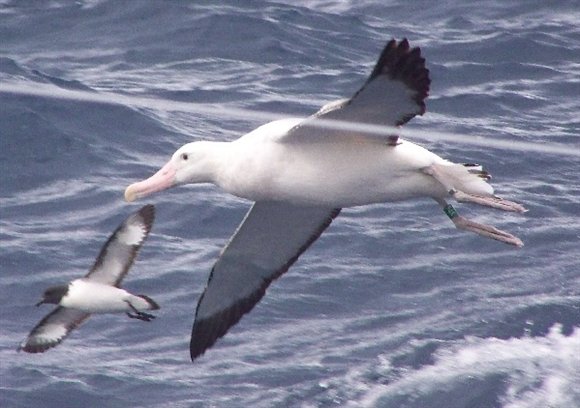Gottfried Sachs (Institute of Flight System Dynamics, Technische Universität München, Garching, Germany) and colleagues, writing open access in the peer-reviewed journal PLoS ONE, have looked at the mechanics of flight in Wandering Albatrosses Diomedea exulans.
The paper's abstract follows:
"Albatrosses do something that no other birds are able to do: fly thousands of kilometres at no mechanical cost. This is possible because they use dynamic soaring, a flight mode that enables them to gain the energy required for flying from wind. Until now, the physical mechanisms of the energy gain in terms of the energy transfer from the wind to the bird were mostly unknown. Here we show that the energy gain is achieved by a dynamic flight manoeuvre consisting of a continually repeated up-down curve with optimal adjustment to the wind. We determined the energy obtained from the wind by analysing the measured trajectories of free flying birds using a new GPS-signal tracking method yielding a high precision. Our results reveal an evolutionary adaptation to an extreme environment, and may support recent biologically inspired research on robotic aircraft that might utilize albatrosses' flight technique for engineless propulsion."

At ease at sea: a Wandering Albatross off Uruguay. Photograph by Sebastian Jiminez
Reference:
Sachs, G., Traugott, J., Nesterova, A.P., Dell'Omo, G., Kümmeth. F., Heidrich, W., Vyssotski, A.L. & Bonadonna, F. 2012. Flying at no mechanical energy cost: disclosing the secret of Wandering Albatrosses. PLoS ONE 7(9): e41449. doi:10.1371/journal.pone.0041449.
Want to read more about biologically-inspired robot planes? Then click here.
John Cooper, ACAP Information Officer, 9 November 2012

 English
English  Français
Français  Español
Español